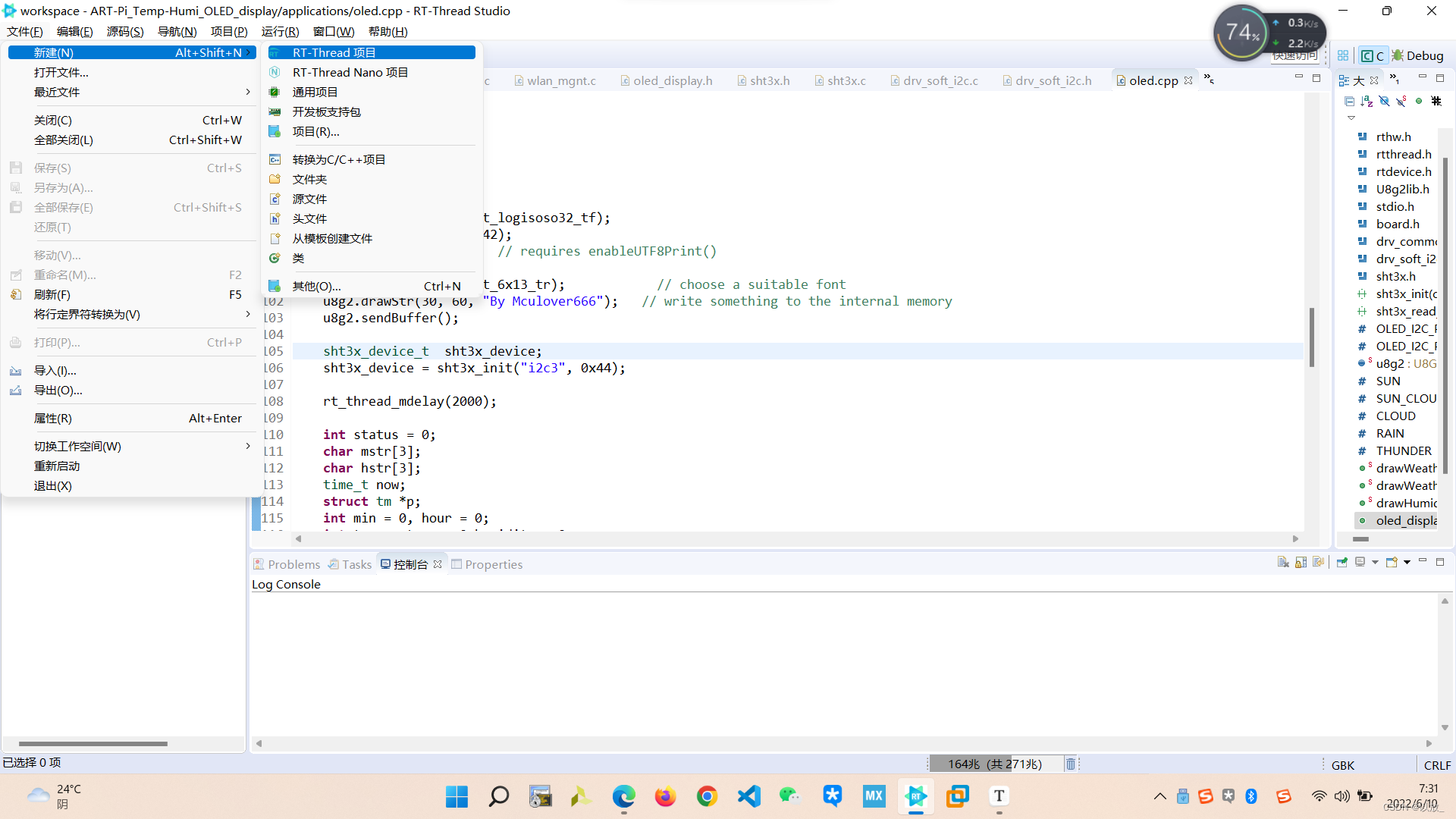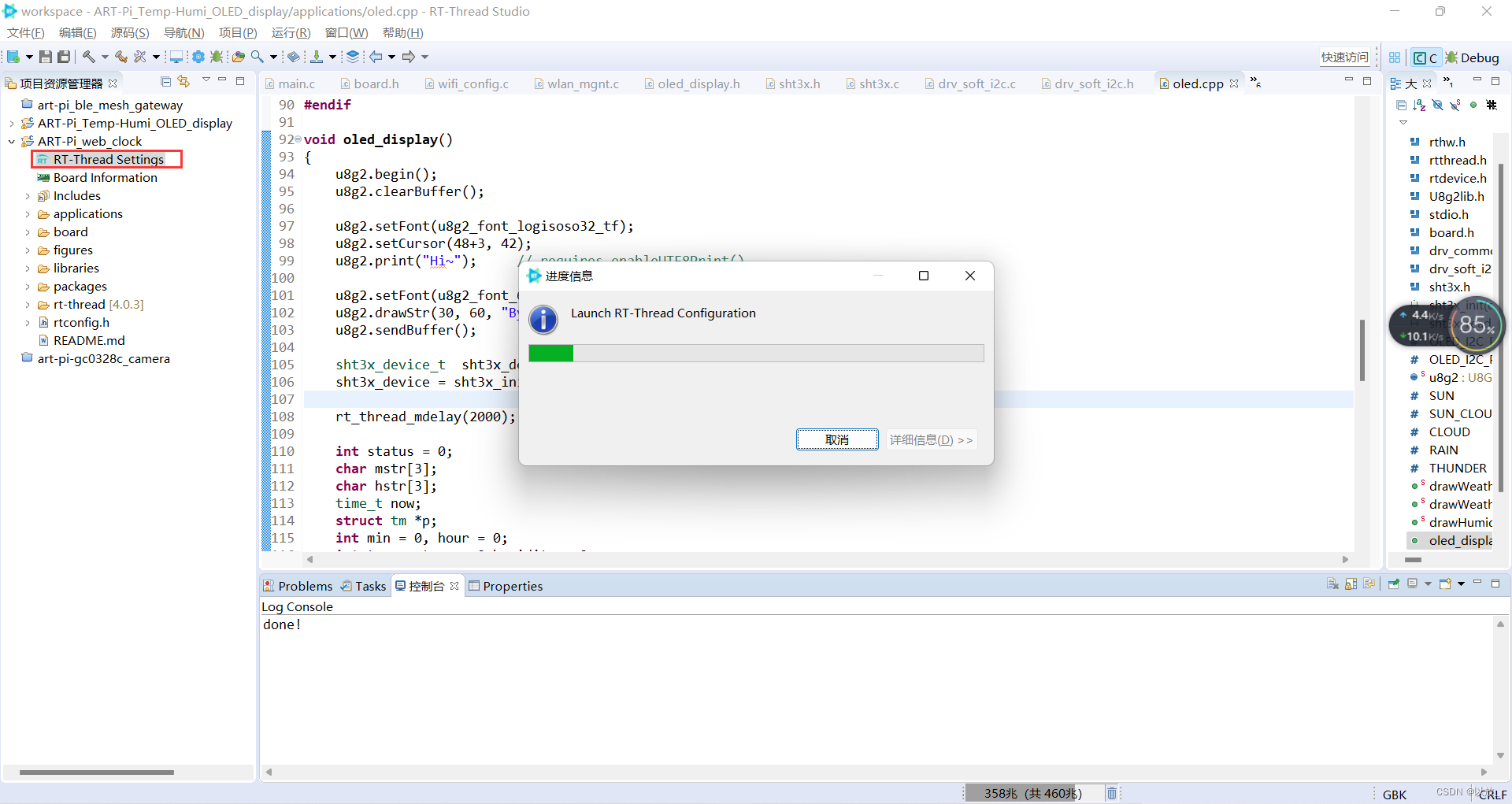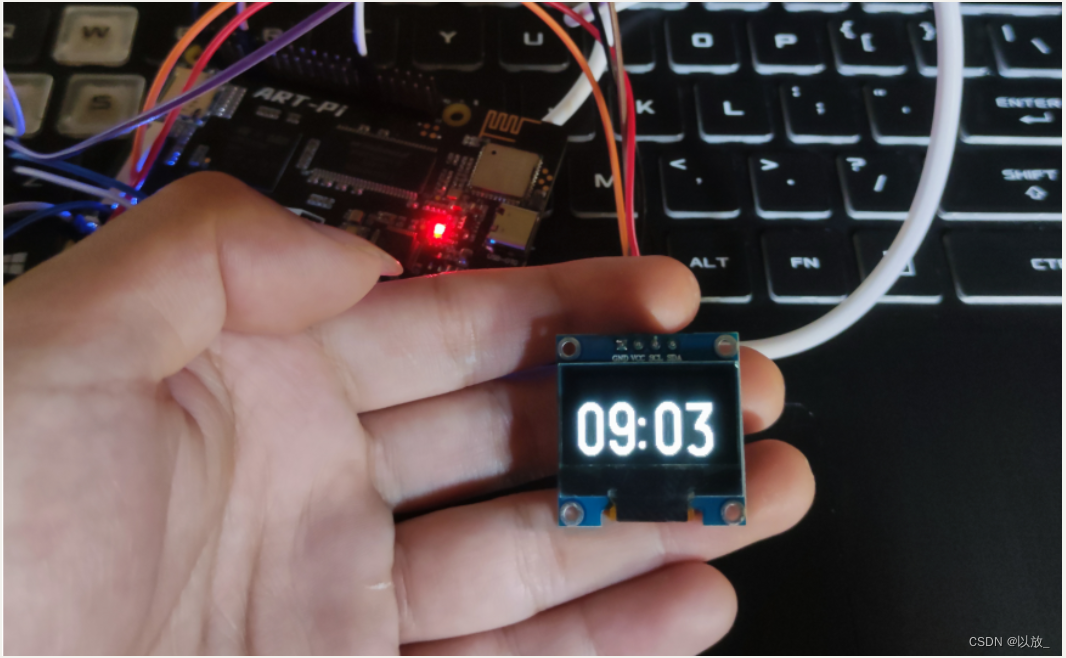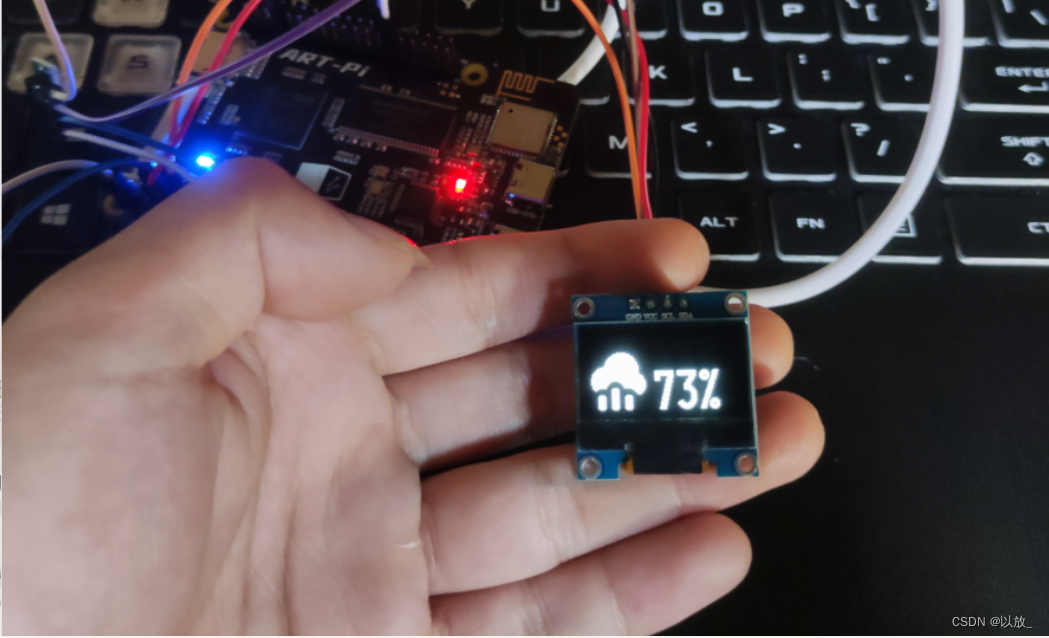1
2
3
4
5
6
7
8
9
10
11
12
13
14
15
16
17
18
19
20
21
22
23
24
25
26
27
28
29
30
31
32
33
34
35
36
37
38
39
40
41
42
43
44
45
46
47
48
49
50
51
52
53
54
55
56
57
58
59
60
61
62
63
64
65
66
67
68
69
70
71
72
73
74
75
76
77
78
79
80
81
82
83
84
85
86
87
88
89
90
91
92
93
94
95
96
97
98
99
100
101
102
103
104
105
106
107
108
109
110
111
112
113
114
115
116
117
118
119
120
121
122
123
124
125
126
127
128
129
130
131
132
133
134
135
136
137
138
139
140
141
142
143
144
145
146
147
148
149
150
151
152
153
154
155
156
157
158
159
160
161
162
163
164
165
166
167
168
169
170
171
172
173
174
175
176
177
178
179
180
181
182
183
184
185
186
187
188
189
190
191
192
193
194
195
196
197
198
199
200
201
202
203
204
205
206
207
208
209
210
211
212
213
214
215
216
217
218
219
220
221
222
223
224
225
226
227
228
229
230
231
232
233
234
235
236
237
238
239
240
241
242
243
244
245
246
247
248
| /*
* Copyright (c) 2006-2021, RT-Thread Development Team
*
* SPDX-License-Identifier: Apache-2.0
*
* Change Logs:
* Date Author Notes
* 2022-06-09 ASUS the first version
*/
#include <rtthread.h>
#ifdef BSP_USING_WIFI
#include <wlan_mgnt.h>
#include <wlan_cfg.h>
#include <wlan_prot.h>
#include <easyflash.h>
#include <fal.h>
#include <stdio.h>
#include <stdlib.h>
#if (EF_SW_VERSION_NUM < 0x40000)
static char *str_base64_encode_len(const void *src, char *out, int input_length);
static int str_base64_decode(const char *data, int input_length, char *decoded_data);
static const unsigned char base64_table[65] =
"ABCDEFGHIJKLMNOPQRSTUVWXYZabcdefghijklmnopqrstuvwxyz0123456789+/";
static const char base64_decode_table[256] =
{
0x00, 0x00, 0x00, 0x00, 0x00, 0x00, 0x00, 0x00, 0x00, 0x00, 0x00, 0x00, 0x00, 0x00, 0x00, 0x00,
0x00, 0x00, 0x00, 0x00, 0x00, 0x00, 0x00, 0x00, 0x00, 0x00, 0x00, 0x00, 0x00, 0x00, 0x00, 0x00,
0x00, 0x00, 0x00, 0x00, 0x00, 0x00, 0x00, 0x00, 0x00, 0x00, 0x00, 0x3E, 0x00, 0x00, 0x00, 0x3F,
0x34, 0x35, 0x36, 0x37, 0x38, 0x39, 0x3A, 0x3B, 0x3C, 0x3D, 0x00, 0x00, 0x00, 0x00, 0x00, 0x00,
0x00, 0x00, 0x01, 0x02, 0x03, 0x04, 0x05, 0x06, 0x07, 0x08, 0x09, 0x0A, 0x0B, 0x0C, 0x0D, 0x0E,
0x0F, 0x10, 0x11, 0x12, 0x13, 0x14, 0x15, 0x16, 0x17, 0x18, 0x19, 0x00, 0x00, 0x00, 0x00, 0x00,
0x00, 0x1A, 0x1B, 0x1C, 0x1D, 0x1E, 0x1F, 0x20, 0x21, 0x22, 0x23, 0x24, 0x25, 0x26, 0x27, 0x28,
0x29, 0x2A, 0x2B, 0x2C, 0x2D, 0x2E, 0x2F, 0x30, 0x31, 0x32, 0x33, 0x00, 0x00, 0x00, 0x00, 0x00,
0x00, 0x00, 0x00, 0x00, 0x00, 0x00, 0x00, 0x00, 0x00, 0x00, 0x00, 0x00, 0x00, 0x00, 0x00, 0x00,
0x00, 0x00, 0x00, 0x00, 0x00, 0x00, 0x00, 0x00, 0x00, 0x00, 0x00, 0x00, 0x00, 0x00, 0x00, 0x00,
0x00, 0x00, 0x00, 0x00, 0x00, 0x00, 0x00, 0x00, 0x00, 0x00, 0x00, 0x00, 0x00, 0x00, 0x00, 0x00,
0x00, 0x00, 0x00, 0x00, 0x00, 0x00, 0x00, 0x00, 0x00, 0x00, 0x00, 0x00, 0x00, 0x00, 0x00, 0x00,
0x00, 0x00, 0x00, 0x00, 0x00, 0x00, 0x00, 0x00, 0x00, 0x00, 0x00, 0x00, 0x00, 0x00, 0x00, 0x00,
0x00, 0x00, 0x00, 0x00, 0x00, 0x00, 0x00, 0x00, 0x00, 0x00, 0x00, 0x00, 0x00, 0x00, 0x00, 0x00,
0x00, 0x00, 0x00, 0x00, 0x00, 0x00, 0x00, 0x00, 0x00, 0x00, 0x00, 0x00, 0x00, 0x00, 0x00, 0x00,
0x00, 0x00, 0x00, 0x00, 0x00, 0x00, 0x00, 0x00, 0x00, 0x00, 0x00, 0x00, 0x00, 0x00, 0x00, 0x00,
};
static char *str_base64_encode_len(const void *src, char *out, int len)
{
unsigned char *pos;
const unsigned char *end, *in;
size_t olen;
olen = len * 4 / 3 + 4; /* 3-byte blocks to 4-byte */
olen += olen / 72; /* line feeds */
olen++; /* nul termination */
end = (const unsigned char *)src + len;
in = (const unsigned char *)src;
pos = (unsigned char *)out;
while (end - in >= 3)
{
*pos++ = base64_table[in[0] >> 2];
*pos++ = base64_table[((in[0] & 0x03) << 4) | (in[1] >> 4)];
*pos++ = base64_table[((in[1] & 0x0f) << 2) | (in[2] >> 6)];
*pos++ = base64_table[in[2] & 0x3f];
in += 3;
}
if (end - in)
{
*pos++ = base64_table[in[0] >> 2];
if (end - in == 1)
{
*pos++ = base64_table[(in[0] & 0x03) << 4];
*pos++ = '=';
}
else
{
*pos++ = base64_table[((in[0] & 0x03) << 4) |
(in[1] >> 4)];
*pos++ = base64_table[(in[1] & 0x0f) << 2];
}
*pos++ = '=';
}
*pos = '\0';
return (char *)out;
}
/*
* return: length, 0 is error.
*/
static int str_base64_decode(const char *data, int input_length, char *decoded_data)
{
int out_len;
int i, j;
if (input_length % 4 != 0) return 0;
out_len = input_length / 4 * 3;
if (data[input_length - 1] == '=') out_len--;
if (data[input_length - 2] == '=') out_len--;
for (i = 0, j = 0; i < input_length;)
{
uint32_t sextet_a = data[i] == '=' ? 0 & i++ : base64_decode_table[data[i++]];
uint32_t sextet_b = data[i] == '=' ? 0 & i++ : base64_decode_table[data[i++]];
uint32_t sextet_c = data[i] == '=' ? 0 & i++ : base64_decode_table[data[i++]];
uint32_t sextet_d = data[i] == '=' ? 0 & i++ : base64_decode_table[data[i++]];
uint32_t triple = (sextet_a << 3 * 6)
+ (sextet_b << 2 * 6)
+ (sextet_c << 1 * 6)
+ (sextet_d << 0 * 6);
if (j < out_len) decoded_data[j++] = (triple >> 2 * 8) & 0xFF;
if (j < out_len) decoded_data[j++] = (triple >> 1 * 8) & 0xFF;
if (j < out_len) decoded_data[j++] = (triple >> 0 * 8) & 0xFF;
}
return out_len;
}
static int read_cfg(void *buff, int len)
{
char *wlan_cfg_info = RT_NULL;
wlan_cfg_info = ef_get_env("wlan_cfg_info");
if (wlan_cfg_info != RT_NULL)
{
str_base64_decode(wlan_cfg_info, rt_strlen(wlan_cfg_info), buff);
return len;
}
else
{
return 0;
}
}
static int get_len(void)
{
int len;
char *wlan_cfg_len = RT_NULL;
wlan_cfg_len = ef_get_env("wlan_cfg_len");
if (wlan_cfg_len == RT_NULL)
{
len = 0;
}
else
{
len = atoi(wlan_cfg_len);
}
return len;
}
static int write_cfg(void *buff, int len)
{
char wlan_cfg_len[12] = {0};
char *base64_buf = RT_NULL;
base64_buf = rt_malloc(len * 4 / 3 + 4); /* 3-byte blocks to 4-byte, and the end. */
if (base64_buf == RT_NULL)
{
return -RT_ENOMEM;
}
rt_memset(base64_buf, 0, len);
/* interger to string */
sprintf(wlan_cfg_len, "%d", len);
/* set and store the wlan config lengths to Env */
ef_set_env("wlan_cfg_len", wlan_cfg_len);
str_base64_encode_len(buff, base64_buf, len);
/* set and store the wlan config information to Env */
ef_set_env("wlan_cfg_info", base64_buf);
ef_save_env();
rt_free(base64_buf);
return len;
}
#else
static int read_cfg(void *buff, int len)
{
size_t saved_len;
ef_get_env_blob("wlan_cfg_info", buff, len, &saved_len);
if (saved_len == 0)
{
return 0;
}
return len;
}
static int get_len(void)
{
int len;
size_t saved_len;
ef_get_env_blob("wlan_cfg_len", &len, sizeof(len), &saved_len);
if (saved_len == 0)
{
return 0;
}
return len;
}
static int write_cfg(void *buff, int len)
{
/* set and store the wlan config lengths to Env */
ef_set_env_blob("wlan_cfg_len", &len, sizeof(len));
/* set and store the wlan config information to Env */
ef_set_env_blob("wlan_cfg_info", buff, len);
return len;
}
#endif /* (EF_SW_VERSION_NUM < 0x40000) */
static const struct rt_wlan_cfg_ops ops =
{
read_cfg,
get_len,
write_cfg
};
void wlan_autoconnect_init(void)
{
fal_init();
easyflash_init();
rt_wlan_cfg_set_ops(&ops);
rt_wlan_cfg_cache_refresh();
}
#endif
|


















